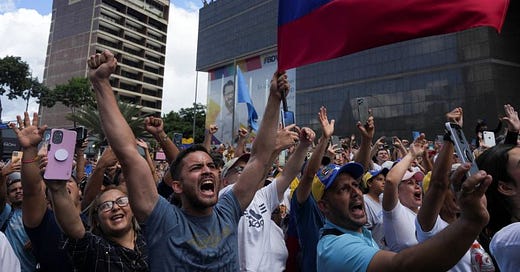Venezuela Voting Machines Declare Socialist Victory, Despite 30% Support
Written by Chriss W. Street
Venezuela’s National Electoral Council declared Nicholas Maduro re-elected for a third term in the nation’s July 28th presidential elections with 51 percent of the vote, compared to 44 percent for opposition candidate. Maduro’s United Socialist Party celebrated the victory by ordering detention of opposition Will of the People party leader Freddy Superlano for his party rioting over claims the election was stolen.
The top military leadership and generals in Caracas made clear in a televised address that they are remaining loyal to the Maduro government, who has regularly manipulated elections in his favor.
The election made it clear to Maduro that he no longer enjoys popular support. His political base relied heavily on people whose livelihoods depended on the government through employment, public aid or other forms of patronage. With the nation’s financial and economic decline, so too did the government’s ability to meet its people’s needs.
Independent public opinion polls suggest the opposition party won 70 percent of the popular vote, so Maduro must face a recount to verify the vote. Voting in Venezuela is performed electronically, so each time someone votes, a receipt is printed and deposited into the ballot box. Counting the votes involves printing a tally of the votes cast on each machine.
According to Geopolitical Futures, “authorities at each voting center send their results to the National Electoral Council. From there, the votes are verified by comparing individual receipts in the ballot box with the vote-counting tally. Roughly half of all voting centers go through this verification process and there have been many reports about failures to properly transmit machine tallies. The opposition knows it will not reverse the National Electoral Council’s results, but hopes to instill doubt within other Venezuelan institutions.
Maduro does not wield absolute power, but does controls large swaths of the government – such as the election council – but not the entire country. Defense Minister Vladimir Padrino Lopez controls the armed forces, who answer to him, as well as some of the country’s critical foreign relationships, particularly the one with Russia.
Maduro must keep Padrino on his side or face a possible putsch by the military. There are also informal power brokers in the mix, such as Diosdado Cabello, who oversees much of the country’s illicit business and drug trafficking activities. He benefits, so long as he doesn’t threaten the regime. Maduro, Padrino and Cabello are all subject to talks and influenced by third parties – be it the U.S., Russia or drug cartels.
Venezuela will face backlash from the international community. Maduro and his predecessor, Hugo Chavez, practice a political ideology derived from the Bolivarian revolution that criticized capitalism and demonizes the U.S. for opposing to Venezuelan ideals. So it naturally has tended to side with countries opposed to U.S. policy, such as Iran, Russia and China.
Maduro as the economic chaos worsened over the past two years, has sought to improve relations with the U.S. and other Western countries. As blowback from the undemocratic elections, United Kingdom, Panama, Chile, Spain, Peru and Argentina have all raised questions over the outcome. Mexico’s outgoing president, Andres Manuel Lopez Obrador, said he would wait for the final vote count before weighing in on the elections, and Brazil has called for greater transparency with the results and verifications for the sake of the government’s legitimacy.
The U.S. will likely increase primary and secondary sanctions against the country. Companies otherwise interested in renewing or signing new business contracts will have to reconsider their plans.
Despite Maduro pronouncing “victory,” Maduro is in an even more precarious situation. Anti-government protests have ramped up and show no sign of drawing down in size, scope or aggression. Another wave of Venezuelan emigration is now expected, which will put more stress on Venezuela’s ties with other nations in the region.




